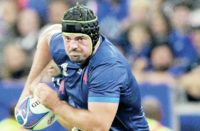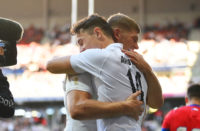 Dean Richards has no peers in the English club game when it comes to building champion teams, and he is at it again at Newcastle. After a few months with Deano at the helm they are already runaway leaders of the Championship, with 11 wins from 11, and the ‘Join the Richards Revolution' slogan on the unofficial Falcons supporters website is a reminder that there is not a manager, head coach, or director of rugby in the club arena in Britain and Ireland – including Warren Gatland and Joe Schmidt – who can match his record.
Dean Richards has no peers in the English club game when it comes to building champion teams, and he is at it again at Newcastle. After a few months with Deano at the helm they are already runaway leaders of the Championship, with 11 wins from 11, and the ‘Join the Richards Revolution' slogan on the unofficial Falcons supporters website is a reminder that there is not a manager, head coach, or director of rugby in the club arena in Britain and Ireland – including Warren Gatland and Joe Schmidt – who can match his record.
Two back-to-back Heineken Cups and four Premiership titles, not forgetting a Championship title with Harlequins – for whom he constructed the team that won the club's first Premiership title last season – takes some beating, and now Richards is back for more.
Having served his three-year ban after Bloodgate, he has used his Midas touch to resurrect the relegated Falcons – who aim to go into Christmas unbeaten by disposing of London Scottish at Kingston Park today – putting them on the road straight back into the Premiership.
However, as Richards, 49, talks candidly about getting back to a job he says is in his blood, he draws a distinction between the day-to-day management of a rugby club, which he loves, and managing the England team, which he says is something he has no desire to do, and never expects to be asked to do.
So, does he regret not having had the chance to manage England before the ban, despite being linked frequently to the post?
“Not at all. I've always been a bit nervous of that phone call because I don't know that I'd want to do that sort of job. I like the cut and thrust of everyday management, whereas at international level there are only 10 games a season, and I don't know what I'd do with myself.
“Also, what happened to Martin Johnson after the World Cup, and the recent ‘Captain Calamity' stuff with Chris Robshaw during the autumn, was all wrong. Now you are not getting rugby reporters, you're getting people looking for the big story all the time. It detracts from the values of how rugby was, and I don't buy into it. I've no interest in exposing my friends, relatives or colleagues to that sort of pressure.”
He adds: “England have had five managers in the eight years since 2004, and that is a very large turnover, more than one change every two years. That's a lot of instability, and it means there is very little chance for people to put in place what they need to.
“The appointment process surrounding Johnno was typically RFU, and a bit bizarre, although that's not to say Johnno wasn't the right guy. His eventual resignation was a great shame, because he offered so much, coming out of retirement to do the job, and I think he got slaughtered by people who didn't understand what he was trying to do.”
Given that summary of the England territory, when Richards says he is happy to bed-down in the north-east it is persuasive.
“I'm very happy at Newcastle…my passion has never diminished. For the last two years of my ban I couldn't stop watching rugby, and I probably watched more last year than I did as a manager. I suppose that after you are away for a few years you see the game in a slightly different light. A lot of the directors of rugby are under a lot of pressure, some of it undue. But some put pressure on themselves by not controlling their emotions – there is a lot of pent-up frustration, and on Saturday a lot of it comes out.”
Richards describes himself as a bit more chilled than his contemporaries, “I'm probably a bit more mellow than I was before – John Wells can't understand how relaxed I am – maybe because we've not had a really big game yet.”
However, there has always been more of the polar bear than the teddy bear about the former Leicester, England and Lions No.8, and it is revealed when he adds, “But he will see the competitive edge. I don't like losing at anything.”
Ask Richards about a future role with the Lions and he is still wary, but leaves the door ever so slightly ajar, although he says the invitation is very unlikely to come his way simply because he does not expect to coach at international level.
“The Lions is something I would consider because it is a different commitment to England, but you need international experience, so it's probably a non-starter.”
He expects the Lions to emerge victorious from the 2013 Australia tour, just as he did on the1989 tour as the Test No.8, but says it will be knife-edge.
“The Lions chances are strong, and Australia have not been firing of late. They are a weaker side than the Australia of five years ago, although if everyone was available, and not overseas, they would be a more dangerous team. However, Robbie Deans will prepare meticulously, and although the Lions will go there as favourites, it will still be close.”

For the foreseeable future, though, the Richards focus is closer to his new home. He is dedicated to the business of putting rugby back on the map in the north-east, while at the same time firing a fusillade at a Championship play-off system which he believes is completely flawed.
“It's ill thought out, and it doesn't lend itself to people wanting to put the right foundations in place. You could have a team unbeaten for a whole season lose by two points in the play-offs and not go up, and that's totally unjust. So is the fact that you finish on May 29 and cannot really recruit or plan for the following season until then, while at the same time, with the minimum criteria out of the way, any Tom, Dick or Harry can go up.
“There's more of an edge to the Championship than there was when I was here with Quins. The London Welsh decision has changed things, and it's not as nice a league. That's what happens when you can just move 40 miles away without putting any culture in place, or get teams trying to get through the back door by buying in 15 players for the play-offs. There's something not right about the way the Championship is structured.”
Richards says that there are parallels at Newcastle with the rebuild he did at Harlequins in terms of his method, but also that it is a fresh challenge with a new, enthusiastic group.
“I look at trying to get the culture right. That means a good team ethic, and players who work for each other. I don't like people to be above the team, and I want them to strive for excellence. If you don't have people who do that, and who are content with their lot, then it's not enough – they have to want to learn, and to improve.
“But it's always going to be different – there are different players and coaching staff, and you work in a different environment. The Newcastle players are a lovely group, with a good work ethic. They are very self-critical and will analyse their game to the nth degree. Sometimes that takes a while, and it's good that they have got there so quickly.
“When I was at Harlequins there were senior players like Tony Diprose and Andre Vos who made a big contribution, and it's the same here with James Hudson, Ali Hogg, Rory Lawson, Bobby Vickers and Jimmy Gopperth. They are the senior guys, but are not aloof or above the others just because they are a leadership group.”
When it comes to producing the goods on match day Richards says that No.8 Hogg has been outstanding. “Why Scotland are ignoring him I can't understand. He is a very clever player and provides real leadership – he reads situations very well and his execution is second to none.”
Where other rugby bosses are sensitive about their job descriptions, and seem desperate to have their coaching credentials recognized, Richards is clear-cut: “I'm a manager without a doubt – I don't coach out on the field, I appoint coaches to do that. I'm a facilitator. I get players to play to the top of their game, and when all 15 do that, it's looking good. More than anything it's about creating the culture and putting the right values in place, while also dealing with the recruitment of players and support staff.”
He says that selection is also a crucial part of his remit, as it is with Stuart Lancaster, and that says the England head coach is still learning the trade.
“The interesting thing is that if you put 10 coaches in a ring then you would probably only get two people picking the same team because there is so much variation in styles and the players picked to deliver them. Selection is a massive part of Stuart Lancaster's remit, and I think he's still learning that game. England are going in the right direction, but still have a long way to go.”
However, one Lancaster selection he endorses wholeheartedly is that of Robshaw, one of his proteges at Quins.
“I played Chris at 6, but he's a bit of a six-and-a-half. The thing is that he never lets anybody down, and he always rises to the challenge and performs to a level that surprises people – and he does it consistently. He's done well. He's a very good 7, and also a very good 6.”
As for the heights Harlequins have hit since his post-Bloodgate departure, Richards is delighted. “It's given me a lot of pleasure because a lot of the guys I know. I was pleased from the players' perspective more than anything because it is starting to happen for them after so much hard work.”
Richards wants Newcastle to emulate the success he has had at Leicester and Harlequins: “Heineken Cups and Premierships are not easy to win. It's about getting to that situation where you are in a quarter-final, semi-final, or final, and anything can happen from there. At Newcastle we are ambitious, and we think we can get there.”
If the new manager's track-record is anything to go by, the rugby regeneration of the north-east's flagship club is a done deal.

























